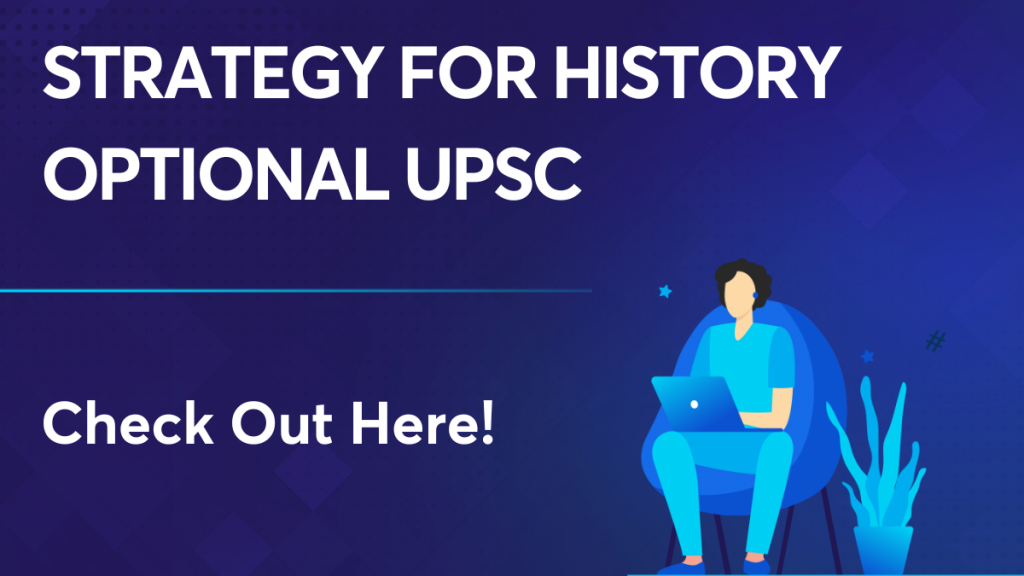History is a very popular subject among those preparing for the UPSC exams. It overlaps with General Studies Paper I and the Prelims, too, meaning that any IAS aspirant cannot avoid reading it. People tend to regard it as a huge option which puts some students off, but with the right tactics and preparation plan, it can be finished in five months. Furthermore, due to its relation to the Prelims and GS, a major part of the IAS syllabus can be covered with this optional. This article will provide an overview Strategy For History Optional UPSC, including its advantages, booklist, preparation method, past performance etc.
Strategy For History Optional UPSC
This section discusses a few Strategy For History Optional UPSC and approaches you can adopt in your history-optional preparation.
Start with the NCERTs
This strategy is great for those new to History and have forgotten what they learned in high school. Many candidates prefer to use the older NCERT books as they present the history in the right order chronologically, allowing them to comprehend the timeline of rulers and events, which can give them a better understanding of the subject. Furthermore, the NCERT books are easy to follow and understand.
Divide and conquer
Breaking down history into smaller pieces can make it simpler to understand. Indian history is generally split into three periods; ancient, medieval and modern. It is beneficial to be familiar with the curriculum of each of these periods before you begin studying. Additionally, it is helpful to create a timeline of events within each section to facilitate revision.
Note making
When you have a lot of material to cover in your studies, making notes and reviewing them is important. Make bullet points for each topic, organised according to topics such as causes, features, significance, criticism/failure, achievement, and impact. This will be beneficial when you have to answer questions that involve making connections. For example, the Cripps Mission’s failure resulted in the Congress Party launching a massive civil disobedience campaign, a factor that ultimately led to the Quit India Movement. Connecting different events in this way can help you understand the material.
Travellers and sources
It is essential to familiarise yourself with the various travellers who have visited India in the past, such as Al Biruni and Fa Hein. You should understand their perspectives of Indian society, economy, and government during their time here and what we can glean about our history from their writings.
Previous year’s question papers
You should thoroughly review the past year’s exams, particularly the last decade. Since many of the questions have been asked again, this endeavour should facilitate comprehension of the primary aspects of the course.
Relate to modern times
Attempt to relate your responses to the current political and economic climate whenever feasible. Doing so will enhance the quality of your answers.
Maps
You should study maps regularly, as it is a common source of examination questions. Consult various sources to ensure accuracy, as only thorough practice can lead to success in this area.
Mock tests
Complete as many practice tests as possible to ensure you understand the subject. Work on practising your answers for the Main exam and have your mentor evaluate them to measure your level of preparation and identify any errors. Repeat this process continuously!
Strategy For History Optional UPSC- Books
Here we will discuss the different topics covered in each book and the different approaches used to teach the material. By the end of this, you will better understand the different books available and be able to choose the best one for your needs.
- History of Modern India – Bipan Chandra
- India’s Struggle for Independence – Bipan Chandra
- India’s Ancient Past – RS Sharma
- The Wonder that was India – Al Basham
- Ashoka and the Decline of the Mauryas – Romila Thapar
- Medieval India: From Sultanate to Mughals – 1 – Satish Chandra
- Medieval India: From Sultanate to Mughals – 2 – Satish Chandra
- History of the World – Arjun Dev
- Mastering Modern World History – Norman Lowe
- NCERT History Books
- Indian Art and Culture – Nitin Singhania
- Historical Atlas of India
- A History of Ancient and Early Medieval India: From the Stone Age to the 12th Century – Upinder Singh
Strategy For History Optional UPSC: FAQs
You should focus on these sections: European penetration into India, British expansion in India, the early structure of the British Raj and the Economic Impact of British Colonial Rule etc.
You can do well on the exam if you follow the abovementioned procedures.
Yes, it can assist you in staying on track and not deviating.
Following the above instructions, you can pass the test in two months.
Yes. You should thoroughly review the past year’s exams, particularly the last decade.
